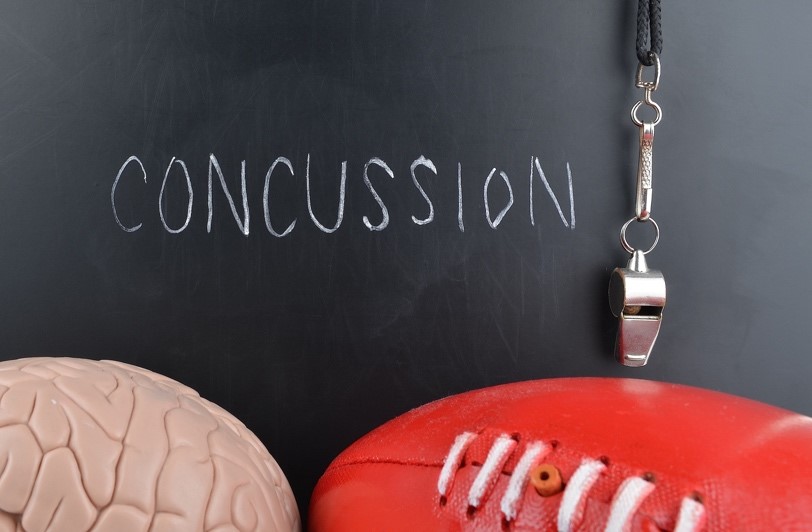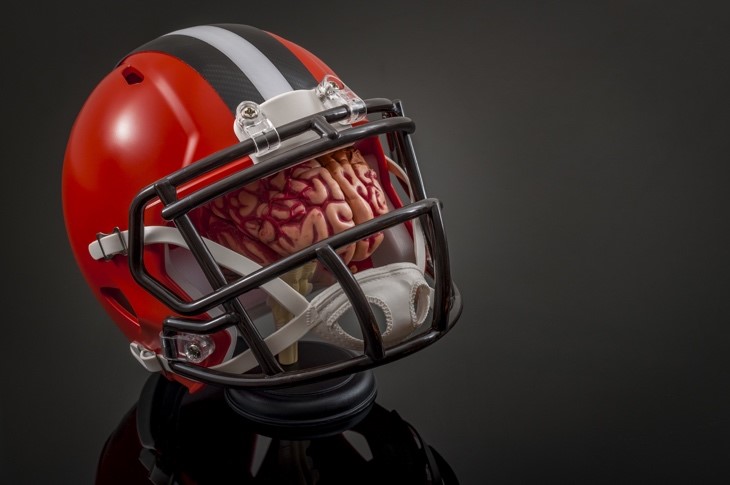What is a concussion?

A concussion is defined as a traumatic brain injury induced by biomechanical forces. Any blow to the head, face, neck or body that causes a sudden jarring of the brain inside the skull may cause a concussion. Common causes of a concussion include car accidents, falls, sports injuries, and violent acts.
The following are signs you may have a concussion:
- Any alteration in mental state at the time of the injury such as confusion, disorientation, slowed thinking, or alteration of consciousness or mood
- Any lack of memory for events immediately before or after the injury (posttraumatic amnesia) not greater than 24 hours
- Any loss of consciousness at the time of the injury, or a decreased level of consciousness for less than 30 minutes
- Physical symptoms such as headache, dizziness, nausea, fatigue, balance problems, light or noise sensitivity, changes to vision or speech, seizures or convulsions
- Cognitive symptoms such as fogginess, confusion, or difficulty remembering or concentrating
- Emotional symptoms such as being more irritable, nervous, anxious or sad
- Being unable to sleep (insomnia), having poor sleep quality, or sleeping too much
What should I do if I think I have a concussion?
If you think you have a concussion, you should do the following:
- Immediately remove yourself from your current activity (sports, work or school)
- Tell a family member, friend, co-worker, teammate, employer, trainer or coach right away that you think you have a concussion
- Get medical attention
- Don’t be left alone, and monitor your symptoms for the next 48 hours
- Rest physically and cognitively. You do not need to be wakened if you are sleeping
- Don’t use alcohol or recreational drugs
- Don’t use any sleeping tablets, aspirin, anti-inflammatories or sedating pain killers
- You can take any prescription medications you normally take
- Don’t drive until you are medically cleared
- Go to a concussion specialist for screening tests within two days of your injury. Some examples of concussion specialists are trained physicians, physiotherapists, athletic therapists, kinesiologists, chiropractors, and occupational therapists
Go to the hospital if you have any of the following:

- A constant severe headache that gets worse
- Drowsiness, inability to be wakened, or a deteriorating conscious state
- Inability to recognize people or places
- Repeated or sudden severe vomiting
- Unusual behaviour or confusion or irritability
- Seizures or convulsions
- Weakness or numbness or tingling in your arms or legs
- Unsteadiness on your feet
- Slurred speech, trouble talking, or not making sense
- Neck pain
- Double vision
Why should I report a suspected concussion?
Over 50% of athlete concussions go unreported or have delayed reporting to their coaches. The most common reasons for this are that the athlete:
- Does not want to let their team down
- Does not want to be removed from their activity
- Does not want to miss future games
- Feels like the concussion isn’t serious and that there is little danger to continue their activity
- Has had similar symptoms in the past and didn’t have any problems then
- Is worried they may lose their spot on the team or be discriminated against by coaching staff

These reasons are also applicable to people who have sustained a concussion in a non-sport environment.
Research shows that when an athlete plays through a concussion and delays reporting it, they miss an average of 5 more days of sport, and are over 2 times more likely to have a prolonged recovery (8+ days). Being removed from their current activity in order to have a quicker recovery time benefits the athlete and their team.
The athletes that report their concussion immediately are shown to return to practice and games faster, and therefore miss fewer future games.
It is important to report a concussion immediately, even if it seems like a minor one, because the person with a concussion needs to be monitored for life-threatening injuries. These include skull fractures, brain bleeds, and spinal injuries. Sometimes these injuries are not immediately apparent and only appear after a period of time. Playing through a concussion could lead to very poor outcomes for athletes with these injuries if they are not recognized early enough.
Once a concussion has been received, the individual is more vulnerable to receiving another concussive force. Any additional concussive force will likely result in more significant symptoms and a slower recovery. There is also the risk of “Second Impact Syndrome” which is extremely rare but will have serious consequences. Second Impact Syndrome is when a person receives a second concussive impact shortly after the first and they lose the ability to regulate the blood flow in their brain. This results in severe and rapid brain swelling and can lead to death within minutes. The age group at highest risk of this are people under 20 years old.
If a person has previously had similar symptoms, they could have sustained a concussion in the past but did not recognise that they had a concussion. People who have had one or more prior concussions are at higher risk of prolonged recovery from any additional concussions. This risk will only increase if an athlete plays through their most current concussion. It is to their benefit, and their team’s benefit, to report the concussion immediately as they will recover faster.
Coaching staff are becoming more knowledgeable of the implications of an athlete sustaining a concussion. They are more aware of the importance of removing an athlete from play temporarily to return them to sport faster, and are less likely to push a player into playing before they have recovered. Often a player will not be punished by their coaching staff for reporting a concussion, and will be able to return to their spot on the team.
If you think you may have a concussion, you should tell a family member, friend, co-worker, teammate, employer, trainer or coach immediately.
Author: Laura Schuiling – MPT, BSc, FCAMPT, IMS/FDN
McCrory et al. Consensus statement on concussion in sport – the 5th international conference on concussion in sport held in Berlin, October 2016. Br J Sports Med. 2017: 0, 1-10.
Delaney et al. Why university athletes choose nor to reveal their concussion symptoms during practice or a game. Clin J of Sport Med, 2015: 25, 113-125.
Asken et al. “Playing through it”: Delayed reporting and removal from athletic activity after concussion predicts prolonged recovery. J of Athletic Training, 2016: 51, 329-335